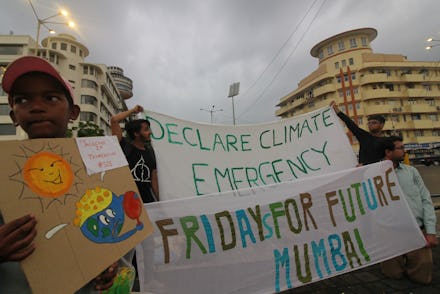Forget "climate change," 11,000 scientists just declared a "climate emergency"

The Earth is in a 'climate emergency,' declare over 11,000 scientists from around the world, and communities around the world need to take immediate action against climate change. A paper from the Alliance of World Scientists, published on Tuesday, has been signed by researchers from 153 countries so far, and draws on years of research data and policies as evidence of the crisis. Progress to fight climate change has been too slow, the authors warn. And they've suggested six areas of focus that governments around the world should prioritize to reduce the effects of climate change.
The report, called the World Scientists’ Warning of a Climate Emergency, starts out with a bang against critics who might accuse the authors of scaring people by calling it an 'emergency.'
"Scientists have a moral obligation to clearly warn humanity of any catastrophic threat and to 'tell it like it is,'" the paper boldly states. "On the basis of this obligation and the graphical indicators presented below, we declare ... clearly and unequivocally that planet Earth is facing a climate emergency."
William Ripple, the co-lead author of the study, explained to Vice's Motherboard why the term 'climate emergency' was more appropriate for the Earth's current situation.
"[C]limate change is more severe and accelerating faster than was expected by scientists," he wrote. "It is threatening natural ecosystems and the fate of humanity. Many of us feel like time is running out for us to act."
He could be right. On Monday, National Geographic published an article that indicated the planet is already facing climate change consequences like rising sea levels. From when the Paris Agreement first started (around 2015) to when participants are supposed to reach their goals (2030), the world will still have "caused enough warming to drive sea levels about 4.5 inches higher in the future." The rising oceans could happen in spite of participating countries reaching their emissions goals by the promised deadline.
But that doesn't mean there's no hope left. Both the scientists in the National Geographic report and the Climate Emergency study believe the impact can still be reduced. A reduction of the effects of climate change can help the planet while giving people living in at-risk areas more time to relocate or create solutions for their communities.
To mitigate the impact of the world's changing climate, and to lessen the risk of harm on vulnerable populations, Ripple and his team suggest six projects that could create a holistic solution to the crisis.
The first project is switching to clean and renewable energy. The fossil fuel industry continues to be one of the largest producers of greenhouse gases. Seeking low-carbon options would be better for the Earth, says the report.
The second project involves reducing the emissions from short-lived pollutants like methane and black carbon (soot). This could "potentially reduce the short-term warming trend by more than 50%" and increase crop yields thanks to reduced air pollution.
The third project is conserving and restoring the Earth's natural ecosystems. This means protecting the places that naturally help the planet reduce the amount of CO2 in the air: coral reefs, forests, savannas, grasslands, and wetlands, to name a handful. Increasing efforts to restore forests will go a long way as well. Preserving the biodiversity and ecosystems of the world could do at least one-third of the work for us, the study authors say. "[U]p to a third of emissions reductions needed by 2030 for the Paris agreement (less than 2°C) could be obtained with these natural climate solutions."
Project four is a tough one for many people — the study recommends greater promotion of plant-based diets. Not only does less meat improve human health, but it also reduces the amount of short-lived pollutants released in the air, decreases the destruction of ecosystems for agricultural business purposes, and encourages better farming practices. The authors also suggest reducing the amount of food waste produced around the world.
For project five, communities should strive to reject exploitative economic systems. Instead of focusing on making money, policy makers should focus on human health. "Our goals need to shift from GDP growth and the pursuit of affluence," insists the study, "toward sustaining ecosystems and improving human well-being by prioritizing basic needs and reducing inequality." Preach, professor.
Lastly, the sixth project places an emphasis on a sustainable global human population. The authors believe this can be done with policies that "make family-planning services available to all people, remove barriers to their access and achieve full gender equity, including primary and secondary education as a global norm for all, especially girls and young women."
The authors don't go into specifics to detail how every country can reach these goals — each community is different and requires customized solutions that both respects the culture and its environment. But the authors believe the current population of humans are well-poised to laying a foundation that can benefit the relationship between mankind and nature for generations to come.
And the scientists are ready, and willing, to provide advice. "As the Alliance of World Scientists, we stand ready to assist decision-makers in a just transition to a sustainable and equitable future," declares the paper. "[S]uch transformative change, with social and economic justice for all, promises far greater human well-being than does business as usual."